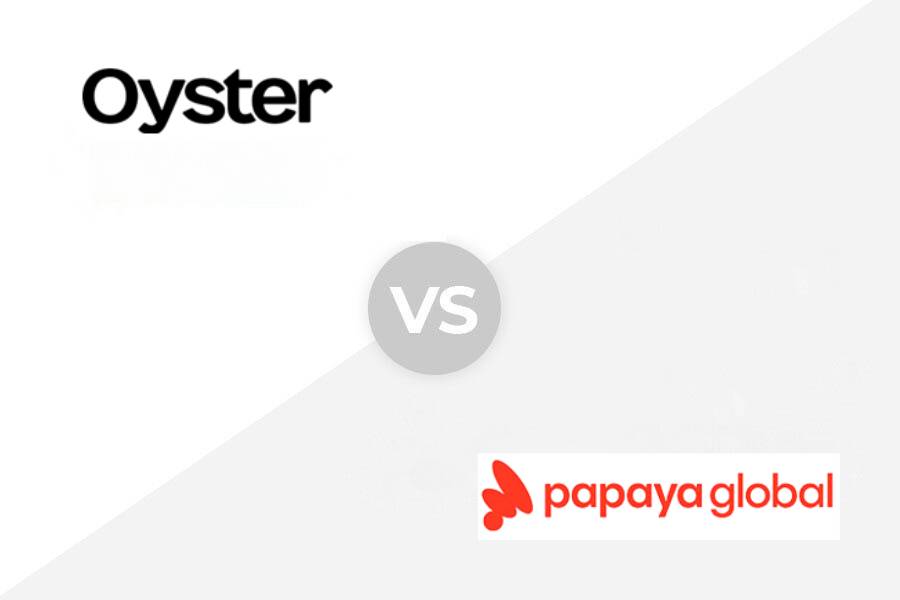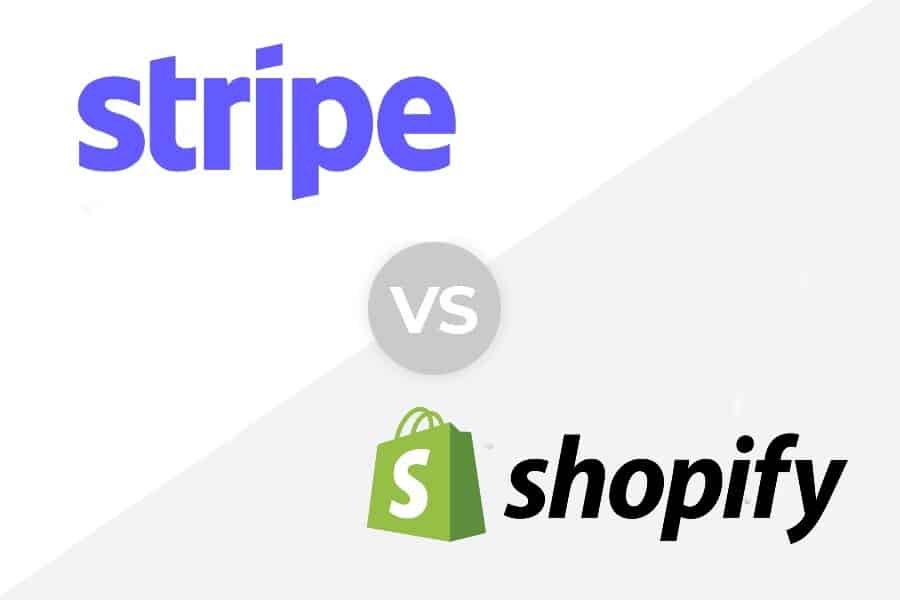
Oyster and Papaya Global offer human resources (HR) for businesses with a global workforce. These two companies primarily assist in international payroll and offer employer of record (EOR) services, which allow them to handle your global employment needs. Both may have similar features, but Oyster’s international contractor payroll coverage is more extensive (180-plus vs 160-plus countries), whereas Papaya has a wider range of global workforce management solutions.
The two providers are on our lists of best international payroll software and top EOR services, but to help you determine whether Oyster vs Papaya Global is right for you, here are our recommendations:
- Oyster: Best for international payroll support and refugee hiring
- Papaya Global: Best for fast salary payouts
Oyster vs Papaya Global Quick Comparison
Both providers offer global payroll, EOR services, compliance solutions, intellectual property (IP) protection, locally compliant online contracts, and access to in-country benefits. Here are some of the standout features and pricing details.
- Companies planning to grow their contractor workforce in many countries: Oyster is a better choice than Papaya because its contractor hiring and payroll services extend to more than 180 countries—which is around 20 countries more than its competitor. It costs a little less than Papaya after it updated its contractor pricing.
- Global businesses looking for a reasonably priced EOR service: If you compare Papaya Global vs Oyster in terms of EOR pricing, they both have the same starter fee at $599 per employee. However, Oyster charges $499 per employee monthly on an annual plan. Also, Papaya collects a setup fee per location for its software licensing if you just want to use its platform but retain your current provider. On the other hand, Oyster requires a refundable security deposit for new clients.
- Nonprofit organizations and B corporation (B-corp) businesses that need global hiring and payroll support: Oyster has discounted pricing for eligible organizations. You can even recruit up to 10 refugee hires for free—provided the hiring is done in countries where Oyster has direct entities.
To know more about the Oyster pros and cons, check out the box below.
Pros
- User-friendly platform with automated hiring and employee management features
- Global HR services for contractors covering more than 180 countries (more than 130 for employees)
- Salary payouts in over 120 currencies
- Extensive library of hiring guides and self-serve tools to get salary and benefits insights and analyze worker misclassification risk
- A dedicated client success (CSM) manager assigned to its customers
Cons
- EOR fees may vary depending on the country
- New clients are charged a refundable security deposit
- Access to localized employee benefits is a paid add-on
- Dedicated CSM is available only in its higher tier
- It lacks a free plan (although you can sign up for free and view its platform—you’ll be charged once you start hiring workers)
- Companies looking for a global payroll service with fast payment timelines: Papaya Global can handle multicurrency and cross-border payments with ease. Salary payments are sent to employee bank accounts if not immediately, within 72 hours.
- Businesses with plans to expand operations globally: Expanding your business into other countries requires hiring full-time employees to handle day-to-day operations. Papaya Global can help fill your workforce management needs with its EOR services that allow it to hire and pay employees in over 160 countries (Oyster’s EOR service is limited to at least 130 countries).
- Businesses needing assistance in managing international contractors: Papaya has a network of in-country partners that can help you find and recruit international contractors in more than 160 countries. With its Agent of Record (AOR) plan, Papaya will assess each contractor’s worker classification to ensure that you comply with local labor laws and regulations.
Check out the box below to learn more about the advantages and drawbacks of using Papaya Global’s services.
Pros
- Transparent pricing with a wide range of product offerings (such as EOR, full-service payroll, data insights, and global benefits)
- International payroll, contractor management, and EOR services cover more than 160 countries
- Fast global payments—from immediate to 72-hour payouts
- Robust reporting with more than 20 analytics dashboards
- New clients get a dedicated CSM
Cons
- Uses a network of local partners to handle local HR processes (doesn’t own local entities in countries that it services)
- Charges fees for new client onboarding and system setup
- Collects a refundable security deposit
- Can get pricey depending on the services you need and the number of employees you have
- Doesn’t have a free trial or a free plan
Best in Value: Tie
In terms of pricing transparency and having different plans for EOR and contractor payment services, it’s easy to compare Papaya Global vs Oyster because both have these features. However, it’s difficult to assess which provider offers the best value in terms of pricing and services offered because it depends on the solutions you need.
Oyster offers discounts for eligible nonprofits and B-corp businesses, which include free refugee hiring for up to 10 workers. In addition, Oyster’s custom-priced Scale plan allows you to prepurchase at least five user seats for a calendar year at negotiated rates. This is perfect for those who constantly hire employees. What’s great about this plan is that you can reuse the seats that have opened up (in case of employee termination or resignation) within the year at no additional cost.
Oyster also doesn’t charge the setup and client onboarding fees that Papaya collects from new customers. However, the provider requires a security deposit, which is refundable once your contract with Oyster expires. This will be used to cover your employee and contractor payments in case there are delays in funding your payroll account or if there are emergencies.
If you only need to pay contract workers, Papaya Global’s international contractor plan has a robust product portfolio, with services that cover more than EOR and contractor management solutions. This is great for businesses looking for specific features, such as access to local benefits and business analytics.
Note, however, that Papaya charges setup and client onboarding fees. Similar to Oyster, it also collects a refundable security deposit.
Best for Global Payroll: Oyster
In terms of assessing Papaya vs Oyster for global pay processing, we found Oyster as a better option overall because its payroll coverage is more extensive, especially for contractor payments (180-plus vs 160-plus countries). Plus, it has locally owned entities in some of the countries it services that directly handle your payroll—unlike Papaya, which has a network of vetted third-party in-country partners.
Oyster also handles reimbursements with ease given its built-in reimbursement tool. Contractors also don’t have to worry about creating and submitting invoices for client payments because the system will automatically generate these every first day of the month.
On the other hand, Papaya is great for global businesses that prefer fast payments. It can handle cross-border payouts with payments made either immediately or within 72 hours. It also has secure payment deliveries and banking rails, made possible through its partnership with J.P. Morgan and Citibank. It even offers the Global Workforce Wallet, which lets you fund one virtual payroll bank account in the currency of your choice but still allows you to pay workers in their local currency in at least 160 countries (Oyster doesn’t offer this).
Best for Global HR Features: Tie
Both providers have all of the basic HR features you need to handle a global workforce. It can onboard and offboard employees, save worker information in online profiles, provide IP protection and compliance support, and offer locally compliant contracts that you can review and new hires can sign off. Global employee benefits are also available with competitive plans that not only meet in-country labor rules but will also help you attract and retain employees.
While these providers have similar basic HR functionalities, there are some features that make one better than the other. Here are our recommendations for choosing between Oyster vs Papaya in terms of global HR capabilities:
If you have an aggressive hiring plan and need global recruiting assistance, Oyster offers dedicated hiring support to help you find qualified candidates. However, this is only available in its custom-priced Scale plan.
Oyster is also great at providing online learning courses to help your employees succeed in being part of a distributed global team and handling remote work. Several free courses are available via the Oyster Academy, a learning management solution that Papaya doesn’t offer.
A screenshot of some of the courses in Oyster Academy (Source: Oyster)
If you require immigration assistance for your global workforce, then Papaya can help you manage the complexities of moving employees from one country to another for work.
Plus, it provides access to an online company organization chart that you can filter through, zoom in or out, and collapse or expand. Unlike Oyster, Papaya has mobile apps (for iOS and Android devices) where employees can access pay stubs, forms, and their personal information.
Aside from viewing payslips and forms, Papaya Global’s mobile apps allow you to access help documents and receive important company announcements. (Source: Papaya Global)
Best for Reporting: Papaya Global
In the battle between Papaya vs Oyster for reporting capabilities, we found Papaya a better choice for those needing robust reports. Aside from standard reports with customization options, it has over 20 native analytics dashboards that you can use. If you get its Data and Insights Platform License add-on, you can analyze headcount and payroll costs in real time, as well as gain strategic insights into your business.
With Oyster, you do get basic reports, but the options are limited compared to Papaya. As of this writing, it only offers reports that show payroll data, employee and contractor expenses, invoices, and team member employment and personal details. You also can’t customize these reports by adding your own data fields.
Best for Ease of Use & Customer Support: Papaya Global
Papaya Global is our top pick for customer support and ease of use because it handles your initial system setup and offers an online platform that’s generally simple to learn and use. While it may not have Oyster’s benefits advisor and contractor vs employee analyzer tools, Papaya provides access to a dedicated point of contact who can help answer your compliance and software-related questions.
It also seamlessly connects with NetSuite given its built-in integration and application programming interface (API) with the said business software. This makes it easy for you to create automated data maps and syncs between the two solutions for stress-free journal entry updates and reconciliations.
However, Oyster offers more integration options with accounting solutions. Aside from NetSuite, it connects with Xero and QuickBooks Online. It even integrates with Greenhouse for tracking applicants, Okta for secure logins, and Slack for chat communications with your team.
Best for Popularity Among Users: Oyster
To evaluate Papaya Global vs Oyster, we looked at each provider’s average number of user reviews and average overall ratings on third-party review sites like G2 and Capterra. Oyster got a higher number of reviews than Papaya (320-plus vs 60-plus) but in terms of user rating, Papaya led by a slim number (4.55 vs 4.5).
What Users Think: Oyster vs Papaya Global
Users who left positive Oyster reviews on G2 and Capterra liked its informative dashboard, user-friendly interface, and automated contractor invoices. While several reviewers raved about its good customer service, a few users said that not all of its customer representatives are helpful. Reviewers also complained about the lack of phone support and mobile apps for easy access to forms and payslips.
Similar to Oyster, many of the positive Papaya Global reviews on G2 and Capterra are about its user-friendly platform. Some users like that its support team is quick to respond to client questions, while a few others commended its smooth setup and new user implementation processes. However, reviewers dislike its pricey EOR services. Some users also wished for more detailed invoices and additional integration options.
Best Overall: Papaya Global
Papaya Global and Oyster have similar HR and payroll features, but Papaya Global presented other features that gave it an edge over Oyster. These include time tracking, report customizability, customer support, and transparent pricing. Papaya has a time tracking feature, while Oyster offers it to only a few countries. This can impact businesses operating in regions where time-tracking capabilities are not supported by Oyster.
Additionally, Papaya’s reporting feature offers more customization options tailored to specific countries compared to Oyster. This level of customization allows businesses to generate reports that align with the unique requirements and regulations of each country in which they operate. In terms of customer support, Papaya offers live phone and chat support, while Oyster only has chat. Having both can contribute to a more responsive and comprehensive support experience, enhancing customer satisfaction and confidence in the platform.
How We Evaluated Oyster vs Papaya Global
We compared Oyster vs Papaya by looking at several factors, such as payroll and HR features, international compliances, employee benefits options, and onboarding/offboarding processes. We also considered pricing, customer support, ease of use, reporting capabilities, and feedback that actual users left on third-party review sites.
Frequently Asked Questions (FAQs)
Global payroll outsourcing is the practice of hiring external service providers to handle payroll processes across multiple countries on behalf of a company. The outsourcing provider manages payroll operations from a centralized location, leveraging technology and standardized processes to streamline payroll management.
A global payroll platform provides a centralized solution and standardized procedures for managing payroll in different regions. On the other hand, implementing it can be complex and time-consuming, requiring significant investment in terms of money, time, resources, and training.
Bottom Line
In deciding whether to get Oyster vs Papaya Global for your EOR and global payroll needs, you should take a look at your budget and identify the features your business really needs. Papaya Global is great for contractor payments given its affordable contractor plan. While its EOR service is pricier than Oyster, it can help you hire full-time employees in over 160 countries (130-plus for Oyster).
On the other hand, Oyster is optimal for companies looking for a reasonably priced EOR service to hire and pay workers. It doesn’t charge setup and onboarding fees like Papaya does and offers free refugee hiring for up to 10 workers for eligible organizations. It even has employee misclassification and benefit assessment tools that you can use at no cost.





